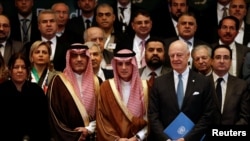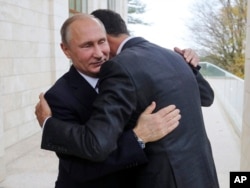Syria opposition representatives meeting in the Saudi Arabian capital called Thursday for direct and unconditional negotiations with the Syrian government over the more than 6-year civil war that would lead to the launch of a transitional period.
The opposition didn't condition its participation in upcoming U.N-based negotiations on the departure of President Bashar Assad from office, signaling a degree of flexibility. The issue has always been the sticking point in previous rounds of talks, deepening division among an already fragmented opposition.
However, in the final communique obtained by The Associated Press, opposition representatives said a peaceful and unbiased transition period will not be possible without Assad first leaving office.
"We set our negotiation goals. We didn't put down conditions," said Ahmed Ramadan, an opposition member of the Syrian National Council said.
Ramadan said different opposition groups with divergent view points on Assad's role in the transition period have found common ground. A unified delegation for the Geneva talks will be announced later Thursday.
It is now up to the government to show seriousness, Ramadan added.
"The message today is that we have a unified vision when it comes to negotiations," he said, speaking from Riyadh.
After major military victories, made possible by his allies Russia and Iran, there seems to be a consensus that the 52-year-old Assad is not going to step down easily after more than six years of war that has killed an estimated 400,000 people and left the country in ruins.
On Wednesday, Saudi Arabia, the host of the opposition meeting, said an international consensus is building for a political agreement, urging the different groups to find a united vision before the talks. Moscow and opposition members it backs have called for an "unconditional" process.
Russia, which provides decisive military support for Assad's troops, has also announced it plans to host separate government-opposition talks next month. Some in the opposition feared it was as an attempt to create a track parallel to the U.N. negotiations.
Ramadan said "there is no excuse now" for the Russia meeting, adding that the opposition wants to operate under the U.N. and its resolutions.
The meeting in the Saudi capital Riyadh brought together opposition groups backed by Gulf countries who have been major backers of the anti-Assad rebellion as well as Russia, Assad's main backer, and Egypt, which had kept contacts with the Syrian government.
Some from the Moscow-backed groups, who call for reforms under Assad, withdrew from the Riyadh meeting Wednesday.
In their statement Thursday, it was the first time the opposition called on the U.N. to arrange for direct talks with the government.
"This would avoid time stalling and prevent attempts to go around the negotiations," Ramadan said.
On Wednesday, Russian President Vladimir Putin said "there is a real chance" to end the conflict, noting that political settlement will require concessions from all sides, including Assad's government. Assad had made a surprise trip to Sochi late on Monday for talks with Putin, which the Kremlin said were intended to lay the groundwork for Wednesday's trilateral meeting.
Putin spoke after a meeting with the leaders of Turkey and Iran in Sochi where they said they will continue to work together to promote a peaceful settlement in Syria.
Iranian President Hassan Rouhani said the groundwork for a political settlement in Syria has been laid. Turkey President Recep Tayyip Erdogan said a "consensus" for an inclusive, free, fair and transparent political process was reached.
On Thursday, Mahir Unal, the spokesman of Erdogan's Justice and Development Party, said Turkey supports a political solution for Syria but retains its "red lines" on the subject of Assad remaining in office.
But Unal said there must be negotiations between Assad and the opposition, which Turkey has supported since the start of the war in 2011.





